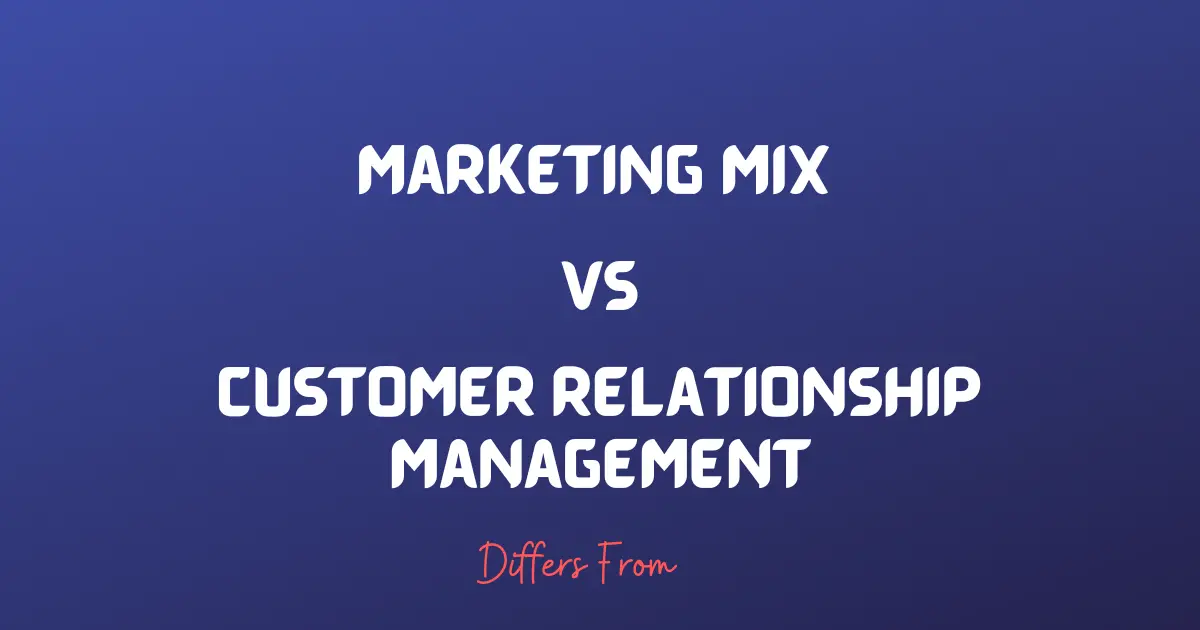In the world of business strategy, two important concepts shape success: the Marketing Mix and Customer Relationship Management (CRM).
As businesses navigate the complex world of markets, it’s crucial to understand the differences between these two ideas. In this exploration, we’ll break down the details that make the Marketing Mix and CRM unique.
We’ll uncover how they contribute to business growth and keep customers loyal.
Let’s explore the basics of these strategies, understand the key elements that define them, and see how each plays a special role in the world of business.
Join us.
Difference between marketing mix and customer relationship management
| Marketing Mix | Customer Relationship Management | |
| Focus and Scope | Primarily concerned with the broader market strategy, encompassing the 4Ps (Product, Price, Place, Promotion). | Concentrates on individual customer interactions, relationships, and experiences. |
| Timeframe | Typically focuses on short-term goals, campaigns, and immediate market impact. | Emphasizes long-term customer loyalty and relationship building. |
| Components | Comprises tangible elements such as the physical product, pricing structure, distribution channels, and promotional activities. | Involves intangible elements like personalized communication, customer service, and understanding individual preferences. |
| Orientation | Product-centric, focusing on creating and promoting offerings. | Customer-centric, tailoring strategies to meet individual customer needs and preferences. |
| Goals | Aims to drive sales, increase market share, and promote brand awareness. | Aims to enhance customer satisfaction, foster loyalty, and maximize customer lifetime value. |
| Approach | Utilizes a mix of promotional channels, pricing strategies, and product development to reach a wide audience. | Leverages data and technology to build personalized relationships, often through targeted communication and customer service. |
| Feedback Loop | Relies on market research, sales data, and campaign analytics. | Incorporates direct customer feedback, behavioral data, and customer service interactions. |
| Flexibility | Can be adjusted for different markets, product lines, and promotional campaigns. | Customizable to the preferences and behaviors of individual customers. |
| Metrics | Metrics include sales figures, market share, return on investment (ROI), and brand visibility. | Metrics involve customer satisfaction scores, retention rates, customer churn, and customer lifetime value. |
| Technology Utilization | Utilizes various marketing technologies for advertising, promotion, and analytics. | Relies heavily on CRM software and tools to manage customer data, track interactions, and personalize communication. |
What is the marketing mix?
Marketing mix refers to the strategic combination of key elements that organizations employ to influence customer purchasing decisions.
It encompasses the “4Ps”: Product (the offering itself), Price (the value exchanged), Promotion (communicating with customers), and Place (distribution channels).
The marketing mix enables businesses to align these elements effectively, creating a compelling value proposition that meets customer needs and drives desired outcomes.
What is Customer Relationship Management?
Customer relationship management (CRM) is a holistic approach that revolves around managing and nurturing interactions between businesses and their customers.
It focuses on fostering enduring relationships by understanding customer preferences, needs, and behaviors. CRM entails employing strategies, tools, and technologies to enhance customer satisfaction, retention, and loyalty.
It involves personalized communication, data analysis, and effective customer service to maximize customer lifetime value and drive business growth.
Comparison between marketing mix and customer relationship management
The marketing mix refers to a set of tactical elements that organizations utilize to achieve their marketing objectives. These elements are commonly known as the “4Ps”: Product, Price, Promotion, and Place.
1. Product:
- Marketing Mix: The product is a fundamental component of the marketing mix, representing the tangible or intangible item that fulfills a customer’s needs or wants.
- CRM: While CRM is not directly involved in product development, it utilizes information about customer preferences and feedback to enhance existing products or services.
2. Price:
- Marketing Mix: Pricing strategies are determined in the marketing mix, considering factors such as production costs, competitor pricing, and perceived value in the market.
- CRM: Pricing decisions can be influenced by CRM data, which may include insights into the price sensitivity of specific customer segments.
3. Promotion:
- Marketing Mix: Involves advertising, public relations, and promotional activities to create awareness and drive sales for a product or service.
- CRM: Utilizes personalized communication and targeted promotions based on individual customer behavior and preferences.
4. Place:
- Marketing Mix: Decides the distribution channels through which a product is delivered to customers, considering factors like convenience and accessibility.
- CRM: Focuses on understanding where and how customers prefer to interact, shaping strategies for personalized outreach through preferred channels.
5. Customer Relationship Management (CRM):
- Marketing Mix: While the marketing mix addresses the overall market strategy, CRM is specifically dedicated to building and maintaining individual customer relationships.
- CRM: Involves strategies, processes, and technology to manage interactions, understand customer behavior, and foster long-term relationships.
6. Understanding Customer Needs:
- Marketing Mix: Market research helps in understanding general customer needs and preferences.
- CRM: Goes beyond general trends, utilizing detailed customer data to understand specific, individual needs and preferences.
7. Personalization and Customization:
- Marketing Mix: Personalization is often at a broader level, catering to target market segments.
- CRM: Offers a higher degree of personalization, tailoring products, services, and communications to the unique preferences of individual customers.
8. Data Management:
- Marketing Mix: Involves data analysis at a macro level for market trends and campaign effectiveness.
- CRM: Requires detailed data management to capture and analyze individual customer data, facilitating personalized interactions.
9. Effective Communication:
- Marketing Mix: Focuses on mass communication strategies to reach a broad audience.
- CRM: Prioritizes one-on-one communication, utilizing customer data for targeted and effective interactions.
10. Customer Service and Support:
- Marketing Mix: Generally addresses customer service as part of the overall brand experience.
- CRM: Places a strong emphasis on customer service and support as a crucial element in building and maintaining relationships.
11. Retention and Loyalty Programs:
- Marketing Mix: This may include loyalty programs but often as a broader strategy.
- CRM: Loyalty programs and retention strategies are core components, aiming to retain valuable customers and enhance their lifetime value.
Conclusion
The marketing mix focuses on tactical elements (product, price, promotion, place) to influence purchasing decisions. Customer relationship management aims to build strong relationships, enhance loyalty, and maximize customer lifetime value through personalized communication, data analysis, and exceptional customer service.
FAQs
How do marketing mix and customer relationship management differ in their focus?
The marketing mix primarily focuses on the tactical elements of product, price, promotion, and place to influence customer purchasing decisions.
Customer relationship management, on the other hand, concentrates on building and nurturing long-term relationships with customers to enhance loyalty and maximize their lifetime value to the business.
What is the main objective of the marketing mix compared to customer relationship management?
The main objective of the marketing mix is to effectively market and sell products or services by considering factors such as product features, pricing strategies, promotional activities, and distribution channels.
Customer relationship management, however, aims to enhance customer satisfaction, retention, and loyalty by focusing on personalized communication, data analysis, and exceptional customer service.
How do the marketing mix and customer relationship management differ in terms of their time horizons?
The marketing mix is often implemented in a shorter time frame and is geared towards achieving immediate marketing goals, such as increasing sales or launching a new product.
Customer relationship management, on the other hand, takes a longer-term approach, aiming to build enduring relationships with customers over time and maximize their lifetime value to the business.
How do marketing mix and customer relationship management differ in their use of data?
The marketing mix relies on market research and data analysis to determine product features, pricing strategies, promotional campaigns, and distribution channels.
Customer relationship management, on the other hand, places a strong emphasis on customer data management, capturing and analyzing customer information to understand their needs, preferences, and behaviors, and to personalize communication and offerings accordingly.
Are the marketing mix and customer relationship management mutually exclusive concepts?
No, the marketing mix and customer relationship management are not mutually exclusive concepts. In fact, they often complement each other.
The marketing mix provides the foundation for attracting and acquiring customers, while customer relationship management focuses on cultivating and retaining those customers through personalized experiences and effective relationship-building strategies.
How do the marketing mix and customer relationship management differ in their impact on business success?
The marketing mix plays a crucial role in creating awareness, generating leads, and driving initial sales. It helps businesses establish a market presence and attract new customers.
Customer relationship management, on the other hand, contributes to long-term business success by fostering customer loyalty, increasing customer retention rates, and maximizing the lifetime value of customers through repeat purchases and positive word-of-mouth.
Can a business effectively implement customer relationship management without considering the marketing mix?
While customer relationship management focuses on building relationships with customers, it is essential for businesses to have a strong marketing mix foundation in place.
The marketing mix provides the strategic framework for product development, pricing, promotion, and distribution, which are key factors in attracting and acquiring customers.
Effective implementation of the marketing mix enhances the success of customer relationship management initiatives by ensuring a compelling value proposition for customers.

